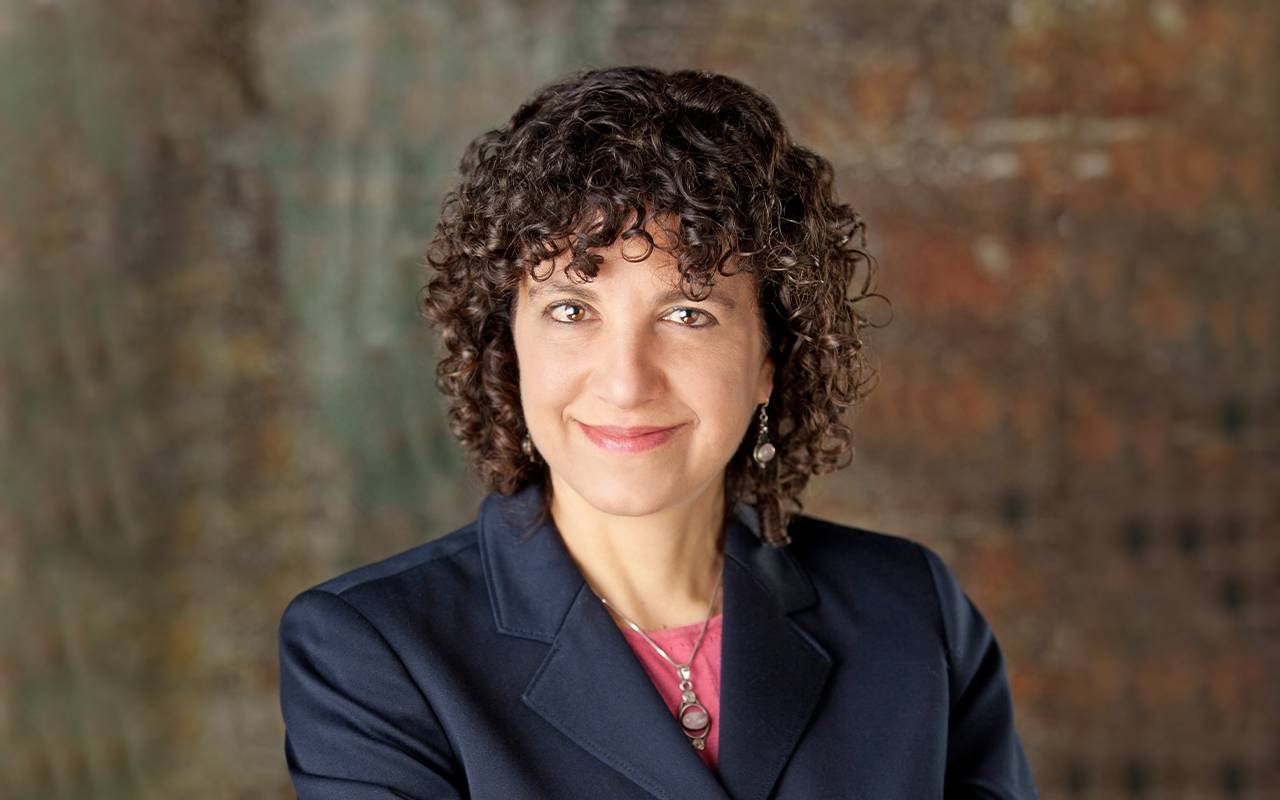Becca Levy: Breaking Stereotypes About Aging
Negative messaging about aging can affect our health. Becca Levy is calling for an age liberation movement.
The negative perceptions of aging that seem to be everywhere — in the media, even in our own communities — aren't just part of social discourse. Becca Levy, PhD, a 2022 Next Avenue Influencer in Aging, says that negative age beliefs can "get under our skin" in serious ways. They can physically impact our health as we age.

Levy is a professor of epidemiology at the Yale School of Public Health and professor of psychology at Yale University. She's also a scientific adviser to the WHO (World Health Organization) Campaign to Combat Ageism. Over the course of her career, Levy has received several honors from organizations including the American Psychological Association, the Gerontological Society of America, and also Next Avenue. This is Levy's second time being named a Next Avenue Influencer in Aging — the first was in 2016.
For all of the vital work Levy has done in the field of aging, we felt she deserved further recognition. 2022 saw the release of her book "Breaking the Age Code: How Your Beliefs About Aging Determine How Long and Well You Live."
In her book, she writes that change starts inside our heads, as all of us need to quiet the lifelong voice about growing older "that's been occupying the inner reaches of [our] mind."
And as we reach the ages of fifty and beyond, the voice can get louder. "Breaking the Age Code" not only offers data-driven analysis of how negative messaging can affect us both physically and emotionally, but actionable steps that we as individuals, and as a society, can take to live a life of positive aging, where we can be happy, creative and in good health.
Negative Societal Messages
According to Levy, we're routinely fighting a lot of negative messaging about aging in our culture. "From advertisements, to television, to other forms of media, to everyday conversations, it's there," she said. "There's profit to be made in these negative messages about aging; the anti-aging industry, for example, creates this fear about aging, sets it up as something we should fight and overcome, rather than how to embrace it and how somebody can be older and beautiful."
In the book, Levy presents what she calls the "ABC method" to encourage people to adopt an "age-thriving" attitude about aging: increasing Awareness, placing Blame where it's due, and Challenging negative age beliefs.
"That's something I enjoyed about writing the book — thinking about ways this age liberation movement can go forward."
"For the first one, because we know these messages are everywhere, we have to be more vigilant about really noticing them," she explained.
When it comes to blame, Levy said "it's important not to blame aging for our health problems. We can actually modify the way we think about our health, and also realize how ageism itself can be the cause of certain types of health problems," she said.
Levy describes a study where older adults were invited into the lab at Yale; some were primed with positive age messages, some with negative. As she explains in the book, "Participants who were primed with positive beliefs for just ten minutes immediately showed faster walking speeds and better balance ...Those who were exposed to positive beliefs of aging walked better."
The third stage of the ABC method is where the work comes in. "We need to actually challenge negative messages, both on an individual level but also on a cultural level," Levy said. "That's something I enjoyed about writing the book — thinking about ways this age liberation movement can go forward. I think there's evidence that we're on the precipice — there are some signs that we have started to bring about a cultural change."
While social media has its own issues relative to negative messaging around aging, Levy credits the internet with offering many opportunities for mobilization around age liberation that would have been unimaginable in the past — she cites the Pass It On Network, an online platform currently operating in 40 countries, which regularly shares information about aging-related issues, along with ageism-based social problems in various communities.
The Origin of the 'Senior Moment'
We've all heard the phrase "senior moment" — many older adults use it regularly to describe a brief episode of forgetfulness. As Levy writes, the phrase came to life in a very innocuous way. In 1997, a reporter for the Rochester Democrat & Chronicle quoted an older man, a banker, who couldn't remember the score of his ongoing tennis match, and he described it as a "senior moment." And now, the expression is used all over the world; Levy said when she's lecturing in different countries, she asks audience members who has heard the term and every hand goes up.
"We know there are types of memory that stay the same or improve later in life."
"The term doesn't make sense. We know there are types of memory that stay the same or improve later in life," she said. "We know with some of our interventions that we've been able to improve memory by intervening and bolstering age-positive beliefs." (Not to mention the fact that forgetting some small detail, like a tennis score, can happen to people of all ages.)
John Basinger, who lives in Middletown, Connecticut, challenged his own memory in a fascinating way. In 1992, before he was getting ready to turn 60, Basinger, a former stage actor, decided to memorize John Milton's "Paradise Lost," seven lines at a time. It didn't happen quickly — it took him eight years to memorize the 60,000 word poem in its entirety. Basinger then gave a three-day-long recital of the complete piece.
As Levy writes, "Twenty years later, he says he still remembers all of it. The morning of our meeting, he recited one of the poem's twelve books in its entirety as a mental warm-up."
But as Levy says now, Basinger doesn't claim to have a particularly robust memory in general.
"He says he forgets his date book at home," she said. "When I interviewed him, it was interesting to hear him say that his own positive age beliefs really inspired him. He talked about the cellist Pablo Casals who played this beautiful music into his nineties (he died in 1973) and excelled at his craft later in life. So that's what led John to take on his own memory challenge, and then share that with his community."
Whether it's memorizing a long poem, or taking a pottery class, or anything in between, Levy said research reveals the negative stereotype that creativity is "stagnant at a certain age or actually even declines" is actually not accurate.
She said, "Creativity can continue to grow in many different ways in later life. Psychologist James Pennebaker's research shows that certain types of complex thinking increase in later life, which can foster creativity." Pennebaker came to this conclusion by studying the writings of well-known English-language writers over the past 500 years, discovering, as Levy writes, that "the associations between language use and aging in most authors 'were quite remarkable.'"
Find Allies in Young People
To break stereotypes and view aging positively, Levy said there are allies, of all different ages, to be found. "If young people could create a more ageless society, focused on positive age beliefs, that would not only benefit their older loved ones, but also themselves," she said.
"If young people could create a more ageless society, focused on positive age beliefs, that would not only benefit their older loved ones, but also themselves."
There are measurable consequences for younger people to begin adopting more positive age beliefs. "Many decades later, when they turn sixty, those beliefs can significantly reduce their likelihood of having a cardiovascular event," Levy explained.
In Levy's role at Yale, she works with many graduate students who "are really engaging in the ideas" about positive aging.
"Some of them who take my class haven't really been exposed to the ideas of ageism, structural ageism and age beliefs and actually want to take the class because of the more medical findings they know about," she said. "But I've found they are really open to learning new approaches, which is rewarding. They'll take that knowledge forward into their careers."
Demand Structural Change
The time to put a stronger focus on positive age beliefs is now, and in "Breaking the Age Code," Levy offers a series of actionable steps that people can take individually or collectively to tackle negative stereotypes. Suggestions run the gamut from posting on your social media about an article featuring negative age messaging, to running for political office in order to bolster positive age beliefs community-wide.
Levy also calls for an end to structural ageism in medicine, mental health care ("establish intergenerational psychotherapy groups so people of different ages can learn from one another"), the workplace ("incorporate older age in diversity, equity, and inclusion training practices and policies"), education and popular culture ("organize some of the billions of gamers to boycott current video games that include ageist content"), to name a few.
While steps have been taken, more are needed. "There are already many people who are committed to creating a more ageless society and they are embracing the idea," she said. "We want the older population to realize the benefits of positive aging to their own health, and to the health of younger allies, and make change."


